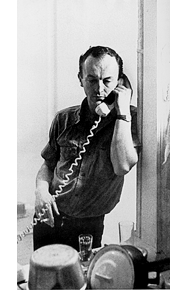Wright, Richard. Native Son. New York: Harper Perennial, 1993.
Finished: 1/12/2011
I’ve taken several African American literature courses over the last 10 years but I had not read Native Son until now. I initially picked it up to get through it before the semester began since it was fairly long. I’m pretty glad I did so because it was difficult to get through—I found myself interested in the daytime but unable to read it in bed or when I was trying to relax. Not difficult in a Joyceian complexity (the prose is actually very clear and concise), but in its somber tone and inherent gruesome nature.
I’m most interested in the ways in which the novel switches between 3rd person and 3rd person omniscient, perspective playing a large role in what the novel is about. Perspective ends up being an extension of a preoccupation with vision, both psycho-social vision—man’s place in the universe, city, fate, and also physical vision—specifically blindness. There is great focus on the eye and whether or not it can see, see appropriately, honestly, authentically, and whether or not what the eye witnesses can be sensed in truth.
This makes sense since much of Bigger’s plight is described through his senses—taste, smell, touch, hearing and seeing. It really reinforces the sometimes-false division between man and society, body and world, and whether or not there is a place where the world or self stops and the rest begins. It seems Wright emphasizes the free movement of sensory information and how it affects the inner-self despite the imposition of artificial but powerful boundaries and limitations created by the government or society in power (in this case in response to race relations).
Another extension of the eye imagery may rest in the idea of an “eye for an eye,” wherein Bigger’s attorney more or less argues that Bigger’s crimes are a response to crimes committed against him. This same dichotomy exists in the conversations about rape, too—Bigger not only willingly commits this action, but claims that he too has been raped, but not in a physical-sexual way. This ties into the themes of helplessness and ambition that are repeated, still coupling with the eye motif in terms of seeing the future, wanting a future, knowing one’s fate or even being prophetic.
Thursday, January 13, 2011
Sunday, January 2, 2011
Books Read in 2010
This list was put together rather hastily upon the arrival of the New Year and seeing exhaustive lists like rikkicupcake's. I read a lot this year, some of which may not have made the list…not to mention the 2-3,000 pages I read of various articles and excerpts for the fall semester.
Here it goes:
Auster, Paul. City of Glass*
Ballenger, Bruce. Beyond Note Cards
Baudrillard, Jean. America*
Bean, John C. Engaging Ideas
Bidart, Frank. Star Dust
Bronte, Charlotte. Wuthering Heights*
Browning, Elizabeth Barrett. Aurora Leigh
Clark, Irene L., ed. Concepts in Composition
Conrad, Joseph. Lord Jim
Conrad, Joseph. Typhoon
DeLillo, Don. White Noise
Dethier, Brock. First Time Up
Dethier, Brock. The Composition Instructor’s Survival Guide
Didion, Joan. Year of Magical Thinking
Fitzgerald, F. Scott. The Great Gatsby*
Gaskell, Elizabeth. Cranford
Hejinian, Lyn. My Life*
Howe, Susan. The Midnight
Ibsen, Henrik. Hedda Gabler*
McCarthy, Cormac. The Road
Morrison, Toni. Beloved
Morton, Timothy. Ecology without Nature
Newkirk, Thomas, ed. Nuts and Bolts
Nicol, Bran. Postmodernism and the Contemporary Novel
O’Hara, Frank. Lunch Poems*
Osteen, Mark. American Magic and Dread
Powell, Jim. Postmodernism for Beginners
Powers, Richard. The Echo Maker*
Primeau, Ronald. The Romance of the Road
Reynolds, Nedra and Rich Rice. Portfolio Teaching
Robinson, Marilynne. Housekeeping*
Ruskin, John. Selected Writings
Straub, Richard. A Sourcebook for Responding to Student Writing.
Tate, Gary, et al., eds. A Guide to Composition Pedagogies.
Tennyson, Alfred Lord. Collected Works
Walcott, Derek. Omeros.
Wenderoth, Joe. Letters to Wendy’s*
*recommended
Promise for 2011:
To keep up with and post books as read! It’s not entirely fair since I am required to read 90% of these, BUT it will be a nice way for me to keep a running tally of what I did read, what I got from it, etc etc to prepare for my comprehensive exams. Neat!
Here it goes:
Auster, Paul. City of Glass*
Ballenger, Bruce. Beyond Note Cards
Baudrillard, Jean. America*
Bean, John C. Engaging Ideas
Bidart, Frank. Star Dust
Bronte, Charlotte. Wuthering Heights*
Browning, Elizabeth Barrett. Aurora Leigh
Clark, Irene L., ed. Concepts in Composition
Conrad, Joseph. Lord Jim
Conrad, Joseph. Typhoon
DeLillo, Don. White Noise
Dethier, Brock. First Time Up
Dethier, Brock. The Composition Instructor’s Survival Guide
Didion, Joan. Year of Magical Thinking
Fitzgerald, F. Scott. The Great Gatsby*
Gaskell, Elizabeth. Cranford
Hejinian, Lyn. My Life*
Howe, Susan. The Midnight
Ibsen, Henrik. Hedda Gabler*
McCarthy, Cormac. The Road
Morrison, Toni. Beloved
Morton, Timothy. Ecology without Nature
Newkirk, Thomas, ed. Nuts and Bolts
Nicol, Bran. Postmodernism and the Contemporary Novel
O’Hara, Frank. Lunch Poems*
Osteen, Mark. American Magic and Dread
Powell, Jim. Postmodernism for Beginners
Powers, Richard. The Echo Maker*
Primeau, Ronald. The Romance of the Road
Reynolds, Nedra and Rich Rice. Portfolio Teaching
Robinson, Marilynne. Housekeeping*
Ruskin, John. Selected Writings
Straub, Richard. A Sourcebook for Responding to Student Writing.
Tate, Gary, et al., eds. A Guide to Composition Pedagogies.
Tennyson, Alfred Lord. Collected Works
Walcott, Derek. Omeros.
Wenderoth, Joe. Letters to Wendy’s*
*recommended
Promise for 2011:
To keep up with and post books as read! It’s not entirely fair since I am required to read 90% of these, BUT it will be a nice way for me to keep a running tally of what I did read, what I got from it, etc etc to prepare for my comprehensive exams. Neat!
Subscribe to:
Posts (Atom)


